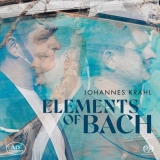Johannes Krahls Lebensmittelpunkt liegt aktuell in Leipzig. Die Nähe zu Johann Sebastian Bach und seiner Musik ist demnach gegeben und definitiv auch gesucht, hört man sich seine neue Aufnahme Elements of Bach an. Da gibt es weitaus mehr als bloß Elemente oder Spuren des Thomaskantors. Johannes Krahl zitiert zu Recht Max Reger, wenn er schreibt: « Seb. Bach ist für mich Anfang und Ende aller Musik; auf ihm ruht und fußt jeder wahre Fortschritt!“
J.S. Bach ist die Leitschnur dieser Produktion – Musik, eingespielt auf einer romantisch geprägten Orgel im Dom zu Bautzen, deren Klang etwas fülliger, runder, warmer ist – von einer milden Intonation schreibt Gutachter und damaliger Thomasorganist Karl Straube nach der Restaurierung der Eule-Orgel im Jahre 1910.
Bachs große Meisterschaft kommt auch in diesem Klangumfeld bestens zur Geltung – so etwa in der Chromatischen Fantasie & Fuge in der Bearbeitung von Max Reger. Was zunächst wie eine Reihe von Versatzstücken erscheint, entwickelt sich in Krauls Interpretation zu einem differenziert wachsenden organischen Gebilde, das in virtuos strömenden Fugenläufen barocker Prägung mündet.
Bei Franz Liszt’ ‘Weinen, Klagen, Sorgen, Zagen’ setzt Krahl auf die breite Klangpalette seines Instrumentes, die ihm eine sehr ausdrucksstarke Lektüre dieser Partitur ermöglicht, fernab von den lisztschen Virtuosenclichés. Dieses eindringliche Werk steigert Krahl aus finsterster Chromatik kontinuierlich, dramaturgisch konsequent hin zum tröstlichen Finale, dem Bach-Zitat ‘Was Gott tut, das ist wohlgetan’.
Mit Max Regers Fantasie & Fuge über B.A.C.H – anschließend an Liszt, der ein gleichgestaltetes Werk geschrieben hat, und uraufgeführt vom Thomasorganisten Karl Straube – schließt sich der programmatische Kreis dieser Aufnahme. Auch hier versteht es Johannes Krahl, mit sicherem Gespür den musik-dramatischen Bogen zu steigern, dessen Spannung und Intensität seinen Höhepunkt in der ebenso packenden wie brillanten Schlussfuge findet.
Johannes Krahl’s center of life is currently in Leipzig. The proximity to Johann Sebastian Bach and his music is therefore given and definitely sought after, if you listen to his new recording Elements of Bach. There is much more than just elements or traces of the Thomaskantor. Johannes Krahl rightly quotes Max Reger when he writes: « Seb. Bach is for me the beginning and end of all music; on him rests and is based every true progress! »
J.S. Bach is the guideline of this production – music recorded on a Romantic-influenced organ in Bautzen Cathedral, whose sound is somewhat fuller, rounder, warmer – the appointed consultant and then St. Thomas organist Karl Straube spoke of a mild intonation after the restoration of the Eule organ in 1910.
Bach’s great mastery is also shown to its best advantage in this sound environment – for example in the Chromatic Fantasy & Fugue in Max Reger’s arrangement. What at first appears to be a series of set pieces develops in Kraul’s interpretation into a differentiated, growing organic structure that leads to virtuosic, flowing fugue runs of a baroque character.
In Franz Liszt’s ‘Weinen, Klagen, Sorgen, Zagen’, Krahl relies on the broad tonal palette of his instrument, which allows him a very expressive reading of this score, far removed from Lisztian virtuoso clichés. Krahl continuously, dramaturgically consistently raises this haunting work from sinister chromaticism to the consoling finale, the Bach quote ‘Was Gott tut, das ist wohlgetan’.
With Max Reger’s Fantasia & Fugue on B.A.C.H – following Liszt, who wrote a work of the same form, and first performed by the Thomas organist Karl Straube – the programmatic circle of this recording is closed. Here, too, Johannes Krahl knows how to increase the musical-dramatic arc with a sure feeling, whose tension and intensity find their climax in the final fugue, which is as gripping as it is brilliant.






















